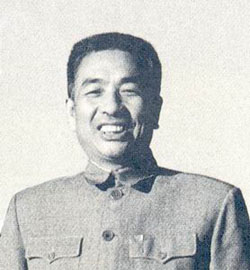Many Chinese have read the essay "Spirit of the Pine Tree" in their middle school literature textbooks. It compares a true communist to a pine tree that never gives up in the face of difficulty.
Its writer Tao Zhu, a senior leader of China's revolution and former vice premier, was wronged and died in the Cultural Revolution (1966-1976).
The 100th anniversary of his birth fell on Wednesday. Li Changchun, a member of the Standing Committee of the Communist Party of China (CPC) Central Committee Political Bureau, addressed the commemoration symposium, calling him "a loyal and outstanding member of the Party".
"He had made remarkable contribution to the independence and liberation of Chinese people and construction of the country," Li said in his speech.
Tao was born in a village in the central Hunan Province and joined the CPC at 18 while studying at Whampoa Military Academy in the southern Guangdong Province.
The school, founded by China's democratic revolution forerunner Sun Yat-sen, was at that time gathering a group of active communists including Zhou Enlai, later the premier of the People's Republic of China, and trained many future famous military leaders.
Tao participated in a number of uprisings against the ruling government in the 1920s and led the party organs in the southern Fujian Province.
During the anti-Japanese war, he organized locals to fight the invaders in central China and, in the civil war, he went northeast joining the battle against the Kuomintang army.
In early 1949, he represented the People's Liberation Army in talks with Fu Zuoyi, the Kuomintang general, for peacefully liberating Beijing.
After working in Guangdong during the 1950s and early 60s, he came to greater attention during the Cultural Revolution when he impressed common Chinese with his vast experience during a time of political chaos when many suffered.
In 1965, Tao became the country's vice premier. The following year when the Cultural Revolution began, he was appointed head of the publicity department of the CPC Central Committee.
As an assistant to Premier Zhou handling the daily government and Party work, Tao had a difficult task when the country was undergoing chaos.
"He tried his best to help Zhou Enlai, in protecting the innocent and maintaining the operation of economic and transport departments, minimizing the damage of the Cultural Revolution," said CPC leader Li.
What he was doing was obviously disliked by some powerful people. One of them, Jiang Qing, was the wife of Chairman Mao Zedong.
In her memoir Tao's daughter, Tao Siliang, writes, "I will never forget Jan. 4, 1967, when some classmates woke me up at midnight and handed me a leaflet. On it was printed a speech written by Jiang Qing and other officials, calling you (Tao) the biggest 'royalist' and accusing you of acting against the Party".
A "royalist" referred to a supporter of Liu Shaoqi and Deng Xiaoping, two Party leaders who were denounced at that time.
The memoir, "A Letter Finally Sent", was published nine years after Tao's 1969 death.
According to his daughter, Tao had been under house arrest since 1967 and had gone through tough inquiries. He died of pancreas cancer alone in the eastern Anhui Province, away from the company of his wife and child.
When his wife last saw him, Tao wrote her a poem. It said that a man would feel as free as in an open world if he could be selfless at heart.
In his famous essay, Tao writes "A communist, like the pine tree, never surrenders to any foul circumstance; a communist, like the pine tree, dies for the interests of the people without hesitation".
In 1978, the CPC Central Committee exonerated him. Since then, his life has been thought of highly.
"The CPC members shall learn from him to be loyal to the Party, care for people's interests most and work hard to seek truth," Li said.
(Xinhua News Agency January 17, 2008)


